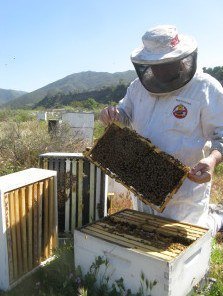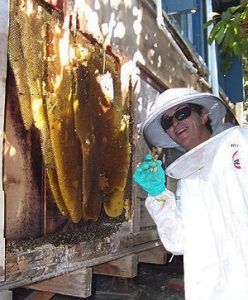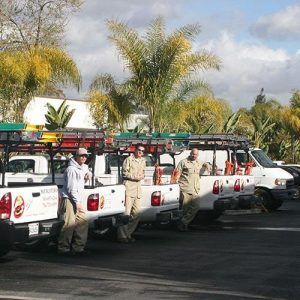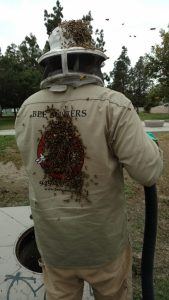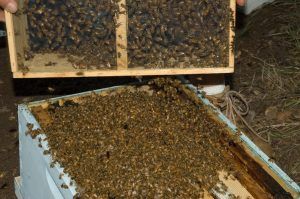Are there really Africanized bees in Orange County?
See Africanized Bees Confirmed in 4 County Cities
There are always lots of bees in urban areas. Resources here are plentiful and they love our Orange County weather. Bees choose locations based on the desirability of a particular nesting site. They love hollow cavity spaces and will check for size, temperature and humidity factors. They want to stay protected from the elements. Any property could be a potential nesting site. Swarms will also stop anywhere that is convenient for them while migrating in search of a new home.
<span”>See Swarms and Colonies.
When are bees dangerous?
Bees are only dangerous when they are defending their colony: nest, honey and brood. They are not dangerous when foraging for pollen, collecting water, nor typically when swarming. This means that it is important to check the area around your home for wild colonies of bees, as they can be easily disturbed and will defend themselves.
If you or your pets have been stung by bees and believe you are having an allergic reaction consult a health care professional immediately.
See our Self-Help Guide and Africanized Bees.
How do I tell if these bees are Africanized (Killer Bees)
You can’t! It requires DNA testing and elaborate measurement tests in order to distinguish the two. The Africanized bee has hybridized with the more friendly European bees that beekeepers brought here first. These hybrids exhibit characteristics of both, and the behavior of a hive can drastically change without warning. Their behavior is NOT an accurate tool to determine whether they are Africanized! You should always just give all bees you encounter the respect you’d give any wild creature.
See Africanized Bees.
Will they leave on their own?
In the case of a Swarm, usually YES. A swarm of bees may stop to rest on just about anything during the migratory process and leave between 1 and 72 hours later. In Orange County, the swarming season occurs mostly during Spring and Fall, but it can occur at other times of the year as well.
Established Colonies will NOT leave once they have set up housekeeping except in extenuating circumstances. Bees may choose various hollow cavities to set up colonies such as your roof, eaves, wall voids, water meter boxes, even a BBQ grill or a birdhouse. It only takes bees about 72 hours to start producing honey and combs once they move in.
See our Self-Help Guide.
Bees need water just like we do. They will gather at swimming pools, ponds, and water coolers in order to find it. Water-collecting bees are docile just as when they are foraging for pollen and nectar. Bees will also communicate to their colony where the best sources of water are so when they find a good spot they are likely to return repeatedly. The only way to rid your property of foraging bees is to take away the water or food source they are coming to. They will become discouraged and go elsewhere. This can be fairly easy with fountains and birdbaths, but not so easily done with an entire pool.
Can I get rid of these bees myself?
Bee Busters does not recommend self-treatment of a bee infestation. An active colony of honeybees can have 10,000 to 60,000 bees in it. What you see on the outside is only a minuscule fraction of what is under the surface. Spraying an active Colony with any ‘over-the-counter’ substance bought at the local hardware store will give the bees reason to become defensive. Also, this method will only exterminate a small fraction of the problem.
When dealing with a Swarm the only self-treatment that Bee Busters recommends is to have patience and let nature run its course. A swarm that has landed on something that does not provide them with a suitable nesting place will not usually stay. Swarms may land on tree branches and the like. Spraying a swarm with water or another substance can cause quite a ruckus and the bees will usually settle back down on the same spot. As with a colony, attempting to self-exterminate your visitors with any method can cause defensive behavior. If a swarm on your property makes you uncomfortable and waiting for nature is not a possibility, give us a call!
Note: Spraying a swarm with water or other substance can damage the queen bee. If she is unable to travel your visitors will stay longer than usual. They won’t leave without her!
See our Self-Help Guide.
Is it illegal to kill bees?
No absolutely not. Bee Busters is licensed by the State of California to perform our services. Government agencies recommend calling a pest control professional when encountering wild feral bees due to the Africanization in this area.
See our Links page.
I heard all the bees are dying. Are bees endangered? And what about Colony Collapse Disorder?
You have probably heard about the mysterious disappearance of honeybees. The story most people have heard is that “the bees are disappearing,” as if they are on their way to extinction. This is simply not the case.
Colony Collapse Disorder as it has been named is the infamous disappearance of large numbers of honeybees beginning in the winter of 2006-2007. It is now well known to the public, but little understood even by experts and people in the industry. There is no absolute solution to the problem to date, and it is widely misunderstood by the general public because of the media hype.
Honeybees are affected by viruses and other pathogens just like humans and every other creature on earth. Beekeepers always have to be concerned about the health of their bees. Over the decades there have been many cyclical losses of bees sometimes for unexplained reasons. The good thing is that today science can help us pinpoint specific problems. In the 1980’s the Varroa mite devastated a very large portion of the honeybee population. Varroa is just one of the problems beekeepers face today.
In cases that have been labeled CCD, a seemingly healthy hive will completely collapse in a very short period of time. Upon inspection, the hive will have almost no adult bees present (nor dead inside or around the hive.) The queen will be left with only a few attendant bees as well as all of the food storage and brood. This baffled beekeepers and scientists alike. It also presents the problem that there are not many dead bees to use for testing.
The general belief among experts to date is that CCD is caused by a pathogen (virus, fungus, bacteria or other disease vector), or perhaps a combination of several. Leading candidates for culprit pathogens include Israeli Acute Paralysis Virus (IAPV) and Nosema ceranae. IAPV has been discovered to have a very strong correlation with CCD, but it does not explain the symptoms of CCD (such as lack of dead bees.) Nosema ceranae is a nastier version of the originally known Nosema apis fungus that has recently surfaced. It has a less clear correlation with CCD, but it lives in the bees’ intestinal tracts and can especially affect forager bees’ life spans. The life of a forager bee is crucial to the hive’s survival as they are providing the food supply for the entire hive.
Research is ongoing as to how these and other pathogens fit together to cause this mysterious phenomenon. While the reports of losses were fairly high for the first two winters, it should be noted that beekeepers always have winter losses. After a beekeeper’s winter losses, they typically ‘split’ their hives to double their stock. They can usually more than make up for any winter loss this way.
Rescuing bees is not necessary to combat the problem of CCD. Bees are not in danger of extinction and they are thriving in urban areas. While some bees can be rescued and cared for by responsible beekeepers, not all bees are good bees. Commercial beekeepers do not want Africanized bees of unknown health or origin introduced into their bee yards, and hobbyists in urban areas have to take many steps to make sure they are responsible neighbors and only keeping good bees. See Bee Rescue and Africanized Bees.
The key to solving this problem lies in good management (by beekeepers) and scientific research working together. It is absolutely wonderful that bee research facilities and programs have been receiving more funding, and things are looking up. We encourage everyone to support his or her local beekeepers and buy local honey!

